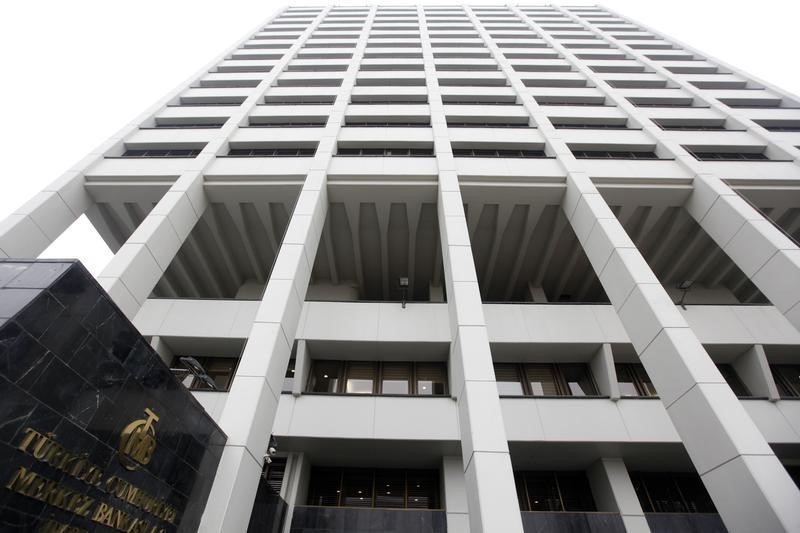By Marc Jones
LONDON (Reuters) - Turkey's financial markets are being battered. The lira is at a record low after slumping more than 20 percent this year, Istanbul's stock market has just had its worst day in over two years and investors are dumping the country's bonds.
Below are a series of graphics that illustrate the scale of the turmoil and show how Turkish assets now compare to those in other heavyweight emerging markets.
1/CAUTION, FRAGILE!
Fathom Consulting's composite indicator of sovereign financial fragility shows just how bad the situation is getting for Turkey. It is aggregated from the default risk, inflation risk, and the spread between the 10-year government bond yield and the central bank policy rate in each country.
Scores are on a scale between 0 and 10, where scores below 1 indicate that the government debt in question is fundamentally safe and scores above 3 indicate that it is fundamentally unsafe.
(GRAPHIC: Turkey heads EM fragility index - https://reut.rs/2NHj2Jx)
2/LIRA LOSSES
The slump in the lira, after a long-term decline since 2010, is the source of much of the current turmoil.
It does damage in two main ways. Firstly, it drives up inflation, which causes problems because the central bank knows President Tayyip Erdogan doesn't like it when it raises interest rates -- the usual policy response to bring inflation back down.
Secondly, it makes any dollar-denominated debt of the government or Turkish firms or consumers more expensive to repay. Bank for International Settlements data shows Turkey has a lot of dollar debt -- $200 billion in fact, not much below Mexico's $265 billion.
The flip side though is that the lira now looks well undervalued. A purchasing parity valuation model used at State Street Global Advisors' calculates it is now 32 percent undervalued. South Africa's rand is the next most undervalued currency at 25 percent while for Mexico's peso it is 18 percent.
(GRAPHIC: Turkey's lira undervalued by a third after slump - https://reut.rs/2NI2CAG)
3/PAY UP
The sell off in Turkey's bond market has been dramatic. And even though the central bank has hiked interest rates 5 percentage points over recent months, the reality is that the country's 15 percent plus inflation means that bond yields in the high teens are in real terms below 1 percent -- not exactly an attractive proposition for investors.
Comparing Turkey's two-year bond yields (TR2YT=RR) -- which hit an all-time high of almost 20 percent on Thursday -- with those of other big emerging markets also paints the picture.
It is more than double the 8.6 percent yield on Brazil's equivalent bonds (BR2YT=RR) and quadruple those on Bangladesh's (BD2YT=RR) which both carry the same BB-/Ba2 Moody's and Fitch sovereign credit ratings.
(GRAPHIC: 'Real' yields in emerging markets - https://reut.rs/2LfCH1q)
4/CREDIT WHERE IT'S DUE
Turkey's high growth rates have been fueled by a credit boom, which can be a risky business. Credit growth is at 20 percent year on year which puts it at number three of all the emerging economies monitored by Bank of America Merrill Lynch (NYSE:BAC), behind only the Argentina and the Democratic Republic of Congo.
IIF data shows also shows that the overall loan-to-deposit ratio in Turkey's banking system is over 100 percent, which means that any significant freeze in lending markets would cause major problems. South Africa, Chile, Mexico and Colombia also have the same risk.
On the plus side, Turkey's banking system has a small proportion of non-performing loans at just 3 percent of the overall amount. That compares to 46 percent in Greece and 56 percent in Ukraine.
(GRAPHIC: Turkey credit growth - https://reut.rs/2NLOOW2)
5/GOING CHEAP
One of the main ways financial analysts measure the value of stocks is their price-to-earnings ratios. The lower the number, the cheaper the stock, effectively, and running the numbers on Istanbul's BIST 100 index (XU100) shows that its overall P/E ratio is now well below that of other big EM stock markets.
(GRAPHIC: Turkey stocks look cheap - https://reut.rs/2NL611O)
